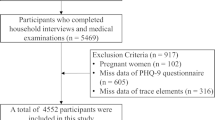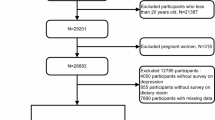Abstract
Depression is one of the most common mental disorders which dramatically threatens public health and wellness. Copper has been known to be involved in many biological processes that could help explaining the occurrence of depression. However, studies focusing on its effect have yielded mixed results. The present study aims to evaluate the association between serum copper levels and depression symptoms. It also investigates the effect of modification of BMI (body mass index) on depression symptoms. A total of 5419 US adults aged 20 years or older from the National Health and Nutrition Examination Survey (NHANES) 2011–2016 participated in the cross-sectional study. Logistic regression models were applied using depression levels as the outcome and serum cooper/selenium/zinc categories as the main predictor, with the adjustments of gender, age, marital status, race, education, family income level, alcohol drinking, cigarette smoking, diabetes, pressure, stroke, and BMI. The interaction terms for copper levels and other covariates were further incorporated into the model to assess their roles in predicting depression symptoms. The prevalence of depression symptoms was significantly higher in samples with a high copper level. Among the levels of serum copper, selenium, and zinc, only the association between depression symptoms and serum copper levels was observed to be significant in the unadjusted model (P = 0.002). Individuals with a high copper level (114–134 μg/dL) and a very high copper level (≥ 134 μg/dL) had 1.85 (95% CI 1.24, 2.77)- and 1.72 (95% CI 1.21, 2.44)-fold higher odds ratio of depression symptoms, respectively, compared to those with a normal serum copper level. Although the association was not significant in the adjusted models, in which confounders were added, the interaction of copper level, including high and very high copper levels, and obesity (BMI ≥ 30 kg/m2) exhibited significantly higher odds ratio (4.12 (95% CI 1.38, 12.27) and 4.53 (95% CI 1.87, 10.96)) of having depression symptoms. The concentration of serum copper was positively associated with the prevalence of depression symptoms. Obesity exacerbated the risk of having depression symptoms in people with high serum copper levels.





Similar content being viewed by others
Data Availability
Data described in the manuscript, code book, and analytic code will be made available upon request pending application and approval from the corresponding author.
References
Disease GBD, Injury I, Prevalence C (2018) Global, regional, and national incidence, prevalence, and years lived with disability for 354 diseases and injuries for 195 countries and territories, 1990–2017: a systematic analysis for the Global Burden of Disease Study 2017. Lancet 392:1789–1858
Mojtabai R (2017) Nonremission and time to remission among remitters in major depressive disorder: revisiting STAR*D. Depress Anxiety 34:1123–1133
Gaynes B (2016) Assessing the risk factors for difficult-to-treat depression and treatment-resistant depression. J Clin Psychiatry 77(Suppl 1):4–8
Shayganfard M (2021) Are essential trace elements effective in modulation of mental disorders? Update and Perspectives. Biol Trace Elem Res 200(3):1032–1059
Twayej AJ, Al-Hakeim HK, Al-Dujaili AH, Maes M (2020) Lowered zinc and copper levels in drug-naive patients with major depression: effects of antidepressants, ketoprofen and immune activation. World J Biol Psychiatr 21:127–138
Liao X, Lai S, Zhong S, Wang Y, Zhang Y, Shen S, Huang H, Chen G, Chen F, Jia Y (2021) Interaction of serum copper and neurometabolites on executive dysfunction in unmedicated patients with major depressive disorder. Front Psychiatry 12:564375
Hesse S, Barthel H, Hermann W, Murai T, Kluge R, Wagner A, Sabri O, Eggers B (2003) Regional serotonin transporter availability and depression are correlated in Wilson’s disease. J Neural Transm (Vienna) 110:923–933
Camarata MA, Ala A, Coskun AK, Deng Y, Gonzalez-Peralta RP, Maciejewski KR, Patel A, Rubman S, To U, Tomlin R, Schilsky ML, Zimbrean PC (2021) The effect of mental health, neurological disease, and liver disease on quality of life in patients with Wilson disease. J Acad Consult Liaison Psychiatr 62(5):528–537
Schaefer M, Gotthardt DN, Ganion N, Wohnsland S, Seessle J, Stremmel W, Pfeiffenberger J, Weiss KH (2016) Wilson disease: health-related quality of life and risk for depression. Clin Res Hepatol Gastroenterol 40:349–356
Zhou HH, Lu F, Chen SD, Zhou ZH, Han YZ, Hu JY (2011) Effect of electroacupuncture on serum copper, zinc, calcium and magnesium levels in the depression rats. J Tradit Chin Med 31:112–114
Salustri C, Squitti R, Zappasodi F, Ventriglia M, Bevacqua MG, Fontana M, Tecchio F (2010) Oxidative stress and brain glutamate-mediated excitability in depressed patients. J Affect Disord 127:321–325
Xu J, He K, Zhang K, Yang C, Nie L, Dan D, Liu J, Zhang CE, Yang X (2021) Low-dose copper exposure exacerbates depression-like behavior in ApoE4 transgenic mice. Oxid Med Cell Longev 2021:6634181
Scheiber IF, Mercer JF, Dringen R (2014) Metabolism and functions of copper in brain. Prog Neurobiol 116:33–57
Peters C, Munoz B, Sepulveda FJ, Urrutia J, Quiroz M, Luza S, De Ferrari GV, Aguayo LG, Opazo C (2011) Biphasic effects of copper on neurotransmission in rat hippocampal neurons. J Neurochem 119:78–88
Kaut O, Schmitt I, Hofmann A, Hoffmann P, Schlaepfer TE, Wullner U, Hurlemann R (2015) Aberrant NMDA receptor DNA methylation detected by epigenome-wide analysis of hippocampus and prefrontal cortex in major depression. Eur Arch Psychiatry Clin Neurosci 265:331–341
Li Z, Wang G, Zhong S, Liao X, Lai S, Shan Y, Chen J, Zhang L, Lu Q, Shen S, Huang H, Zhang Y, Zhang L, Jia Y (2020) Alleviation of cognitive deficits and high copper levels by an NMDA receptor antagonist in a rat depression model. Compr Psychiatry 102:152200
Morrell A, Tallino S, Yu L, Burkhead JL (2017) The role of insufficient copper in lipid synthesis and fatty-liver disease. IUBMB Life 69:263–270
Klevay LM (2011) Is the Western diet adequate in copper? J Trace Elem Med Biol 25:204–212
Al-Othman AA, Rosenstein F, Lei KY (1992) Copper deficiency alters plasma pool size, percent composition and concentration of lipoprotein components in rats. J Nutr 122:1199–1204
Al-Othman AA, Rosenstein F, Lei KY (1993) Copper deficiency increases in vivo hepatic synthesis of fatty acids, triacylglycerols, and phospholipids in rats. Proc Soc Exp Biol Med 204:97–103
Azab SF, Saleh SH, Elsaeed WF, Elshafie MA, Sherief LM, Esh AM (2014) Serum trace elements in obese Egyptian children: a case-control study. Ital J Pediatr 40:20
Gu K, Li X, Xiang W, Jiang X (2020) The relationship between serum copper and overweight/obesity: a meta-analysis. Biol Trace Elem Res 194:336–347
Yang H, Liu CN, Wolf RM, Ralle M, Dev S, Pierson H, Askin F, Steele KE, Magnuson TH, Schweitzer MA, Wong GW, Lutsenko S (2019) Obesity is associated with copper elevation in serum and tissues. Metallomics : Integr Biometal Sci 11:1363–1371
Silva DA, Coutinho E, Ferriani LO, Viana MC (2020) Depression subtypes and obesity in adults: a systematic review and meta-analysis. Obes Rev 21:e12966
Pereira-Miranda E, Costa PRF, Queiroz VAO, Pereira-Santos M, Santana MLP (2017) Overweight and obesity associated with higher depression prevalence in adults: a systematic review and meta-analysis. J Am Coll Nutr 36:223–233
Li Z, Wang W, Xin X, Song X, Zhang D (2018) Association of total zinc, iron, copper and selenium intakes with depression in the US adults. J Affect Disord 228:68–74
Kroenke K, Spitzer RL, Williams JB (2001) The PHQ-9: validity of a brief depression severity measure. J Gen Intern Med 16:606–613
Odutayo A, Gill P, Shepherd S, Akingbade A, Hopewell S, Tennankore K, Hunn BH, Emdin CA (2017) Income disparities in absolute cardiovascular risk and cardiovascular risk factors in the United States, 1999–2014. JAMA Cardiol 2:782–790
Dorfman MD, Thaler JP (2015) Hypothalamic inflammation and gliosis in obesity. Curr Opin Endocrinol Diabetes Obes 22:325–330
Fernandez-Sanchez A, Madrigal-Santillan E, Bautista M, Esquivel-Soto J, Morales-Gonzalez A, Esquivel-Chirino C, Durante-Montiel I, Sanchez-Rivera G, Valadez-Vega C, Morales-Gonzalez JA (2011) Inflammation, oxidative stress, and obesity. Int J Mol Sci 12:3117–3132
Mazon JN, de Mello AH, Ferreira GK, Rezin GT (2017) The impact of obesity on neurodegenerative diseases. Life Sci 182:22–28
Mezzaroba L, Alfieri DF, Colado Simao AN, Vissoci Reiche EM (2019) The role of zinc, copper, manganese and iron in neurodegenerative diseases. Neurotoxicology 74:230–241
de Wit LM, van Straten A, van Herten M, Penninx BW, Cuijpers P (2009) Depression and body mass index, a u-shaped association. BMC Public Health 9:14
Hong SM, Hur YI (2017) Relationship between obesity and depression in Korean adults: Korea National Health and Nutrition Examination Survey 2014. Medicine (Baltimore) 96:e9478
Darimont T, Karavasiloglou N, Hysaj O, Richard A, Rohrmann S (2020) Body weight and self-perception are associated with depression: results from the National Health and Nutrition Examination Survey (NHANES) 2005–2016. J Affect Disord 274:929–934
Narang RL, Gupta KR, Narang AP, Singh R (1991) Levels of copper and zinc in depression. Indian J Physiol Pharmacol 35:272–274
Schlegel-Zawadzka M, Zieba A, Dudek D, Zak-Knapik J, Nowak G (1999) Is serum copper a “trait marker” of unipolar depression? A preliminary clinical study. Pol J Pharmacol 51:535–538
Tanvir S, Asif N, Qayyum R, Ijaz A, Hafeez A, Ali S (2020) Trace metal profiling in patients with depression in Pakistani population. J Pak Med Assoc 70:1883–1886
Slupski J, Cubala WJ, Gorska N, Slupska A, Galuszko-Wegielnik M (2020) Copper concentrations in ketamine therapy for treatment-resistant depression. Brain Sci 10(12):971
Slupski J, Cubala WJ, Gorska N, Slupska A, Galuszko-Wegielnik M (2020) Copper and anti-anhedonic effect of ketamine in treatment-resistant depression. Med Hypotheses 144:110268
Lamtai M, Zghari O, Azirar S, Ouakki S, Mesfioui A, El Hessni A, Berkiks I, Marmouzi I, Ouichou A (2021) Melatonin modulates copper-induced anxiety-like, depression-like and memory impairments by acting on hippocampal oxidative stress in rat. Drug Chem Toxicol 45(4):1707–1715
Acknowledgements
We thank all individuals at the National Center for Health Statistics of the Centers for Disease Control and Prevention who planned and administered NHANES and made the datasets of NHANES available on their website.
Funding
This study was supported by the Scientific Research Fund of the Hunan Provincial Education Department (20C1605, 19B476).
Author information
Authors and Affiliations
Contributions
JZ conceptualized and designed the study. KZ, JZ, and ST participated in the investigation and the drafting of the paper. HW and QL analyzed and interpreted the data. RG and JZ revised the paper critically for intellectual content. JZ approved the final version of the paper to be published. All authors agree to be accountable for all aspects of the work.
Corresponding author
Ethics declarations
Ethics Approval
The protocol of NHANES 2011–2016 (Protocol #2011–17) was approved by NCHS Research Ethics Review Board (ERB).
Informed Consent
There are no plans to disseminate the results of the research to individual study participants because all participants are de-identified. The results of this study will be disseminated as a medical manuscript and will be publicly available on PubMed Central.
Conflict of Interest
The authors declare no competing interests.
Additional information
Publisher's Note
Springer Nature remains neutral with regard to jurisdictional claims in published maps and institutional affiliations.
Rights and permissions
Springer Nature or its licensor (e.g. a society or other partner) holds exclusive rights to this article under a publishing agreement with the author(s) or other rightsholder(s); author self-archiving of the accepted manuscript version of this article is solely governed by the terms of such publishing agreement and applicable law.
About this article
Cite this article
Hongrong, W., Qingqi, L., Rong, G. et al. BMI Modifies the Association Between Depression Symptoms and Serum Copper Levels. Biol Trace Elem Res 201, 4216–4229 (2023). https://doi.org/10.1007/s12011-022-03505-y
Received:
Accepted:
Published:
Issue Date:
DOI: https://doi.org/10.1007/s12011-022-03505-y




